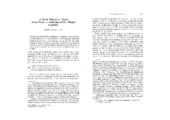| dc.contributor.author | Sandin, Pär Ola | eng |
| dc.date.accessioned | 2010-04-13T10:00:59Z | |
| dc.date.available | 2010-04-13T10:00:59Z | |
| dc.date.issued | 2001 | eng |
| dc.Published | Glotta (77): 110–17 | en |
| dc.identifier.issn | 0017-1298 | |
| dc.identifier.uri | https://hdl.handle.net/1956/3878 | |
| dc.description.abstract | Delocutives are formed with an utterance (x) as a radical. Common in Greek are verbs meaning "say x" (e.g., πατερίζω); nominal formations denote for instance a person saying x or the utterance x per se. The latter type would explain the hapax ποίφυγμα in A. Th. 280, where Eteocles says, upbraiding a group of women for their hysteria: "do not pray in ποιφύγμασιν". If ποίφυγμα is taken as a delocutive nominal formation from ποῖ φύγω (a Greek cliché), the sense would fit the context as well as Aeschylus' propensity for wordplay. | en_US |
| dc.language.iso | eng | eng |
| dc.publisher | Lexis | eng |
| dc.subject | Aeschylus | eng |
| dc.subject | Septem contra Thebas | eng |
| dc.subject | Delocutive word-formation | eng |
| dc.subject | Benveniste | eng |
| dc.subject | Debrunner | eng |
| dc.title | A Greek delocutive noun? Some notes on ποίφυγμα and its alleged cognates | eng |
| dc.type | Peer reviewed | |
| dc.type | Journal article | |
| dc.rights.holder | Copyright Lexis. All rights reserved. Reproduced with permission. | |
| dc.rights.holder | Lexis | eng |
| dc.subject.nsi | VDP::Humaniora: 000::Språkvitenskapelige fag: 010::Klassisk filologi: 032 | |
| dc.subject.nsi | VDP::Humaniora: 000::Språkvitenskapelige fag: 010::Indoeuropeiske språk: 033 | |
| dc.subject.nsi | VDP::Humaniora: 000::Språkvitenskapelige fag: 010::Allmenn språkvitenskap og fonetikk: 011 | |
